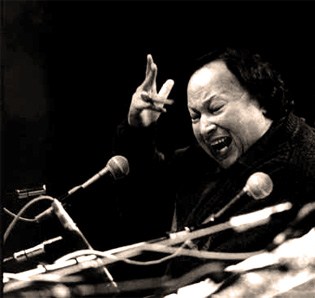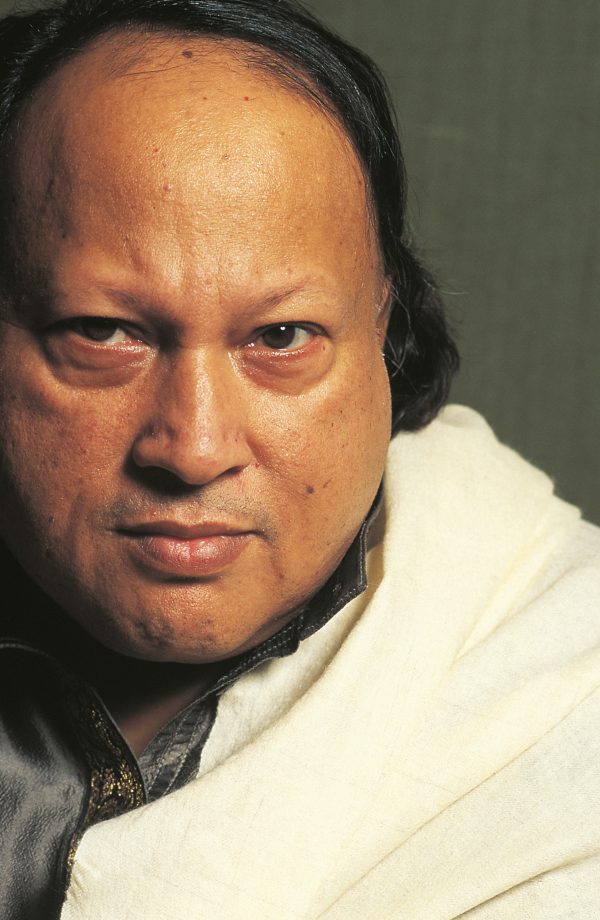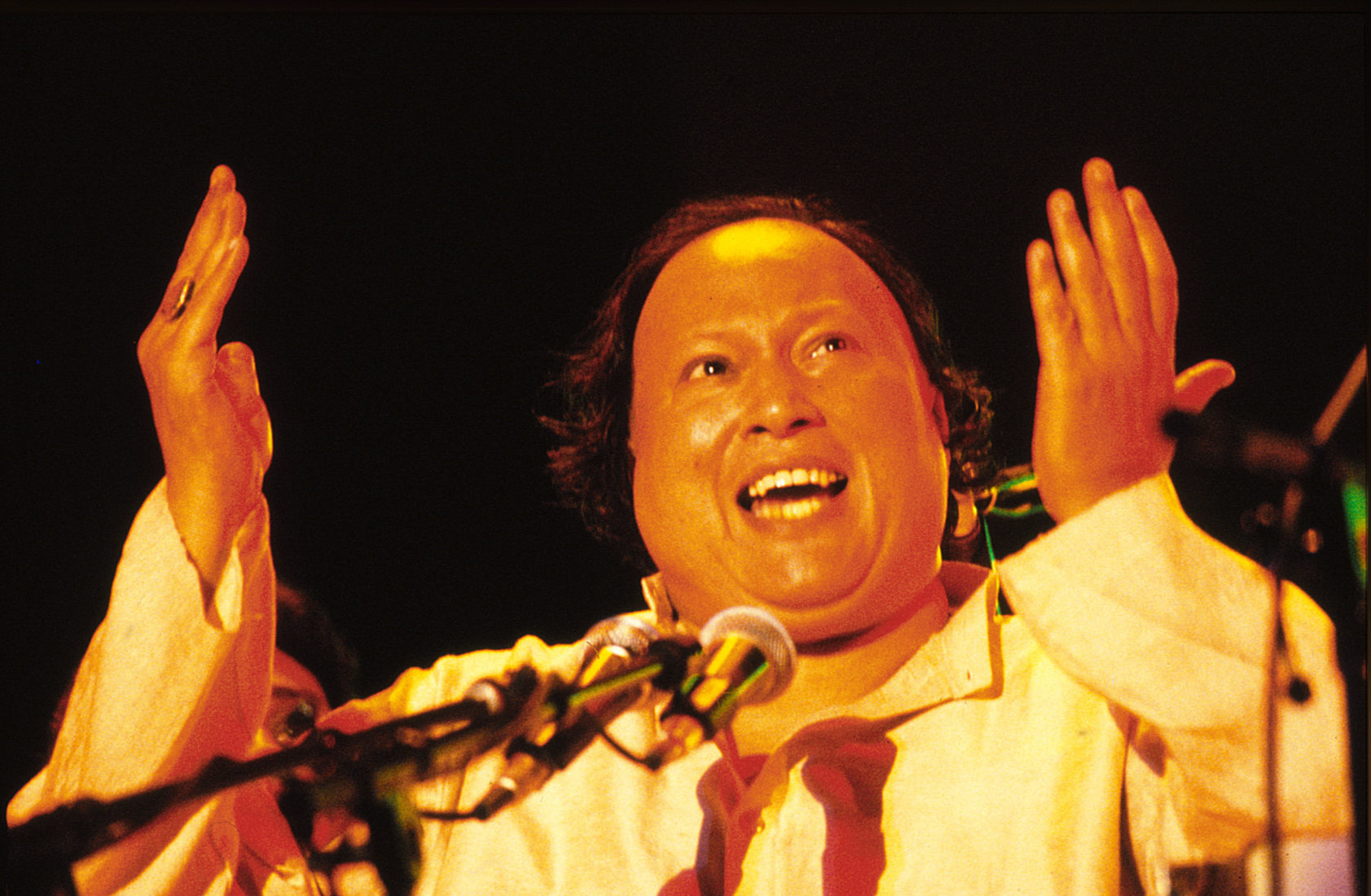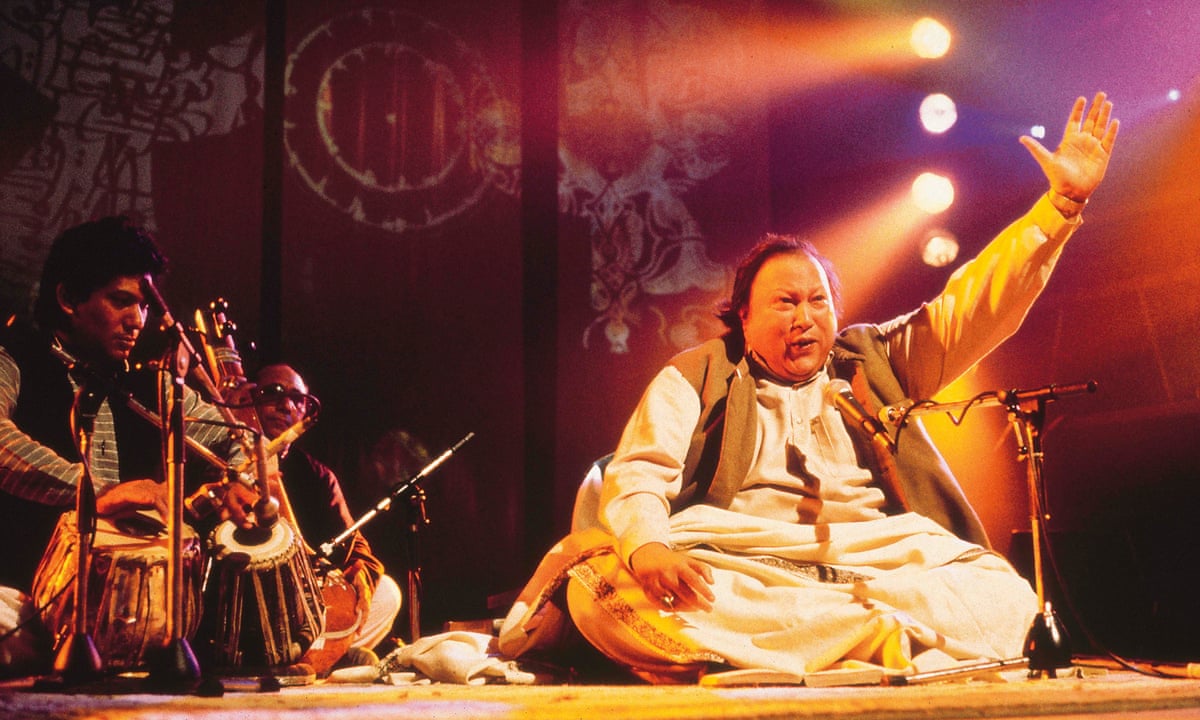Nusrat Fateh Ali Khan
Nusrat Fateh Ali Khan

Ustad Nusrat Fateh Ali Khan, born Pervez Fateh Ali Khan on October 13, 1948, in Lyallpur (now Faisalabad), Pakistan, was a legendary Pakistani singer, songwriter, and music director. Renowned primarily as a qawwali singer, a form of Sufi devotional music, he earned the title "Shahenshah-e-Qawwali" (the King of Kings of Qawwali) for his unparalleled talent and mastery of the genre.
Nusrat Fateh Ali Khan is celebrated as one of the greatest qawwali singers of all time, with The New York Times hailing him as such and LA Weekly ranking him as the fourth greatest singer across genres in 2016. Known for his exceptional vocal abilities and endurance, he could deliver electrifying performances of intense emotional depth for hours on end.
His musical journey began at a young age, and he had his first public performance at his father's chelum when he was just 15. Taking the reins of his family's qawwali party in 1971, he infused his performances with a unique blend of sargam, khayal, and rhythm, elevating the tradition to new heights.
In the early 1980s, Khan was signed by Oriental Star Agencies in Birmingham, England, marking the beginning of his international career. He released albums and movie scores across Europe, India, Japan, Pakistan, and the United States, captivating audiences with his soul-stirring renditions. Collaborating with Western artists, he expanded the boundaries of world music and toured extensively, mesmerizing audiences in over 40 countries.
Beyond popularizing qawwali music globally, Nusrat Fateh Ali Khan left an indelible mark on South Asian popular music, influencing genres like Pakistani pop, Indian pop, and Bollywood music. His legacy continues to inspire musicians and audiences worldwide, making him an icon of Pakistani and world music alike.
Nusrat Fateh Ali Khan was born into a Punjabi Muslim family in Lyallpur (now Faisalabad), Punjab, Pakistan, in 1948. His family traced its roots back to Basti Sheikh Darvesh of Ghazni, Afghanistan, before settling in Jalandhar, Punjab, in present-day India. The family had a rich musical heritage, with ancestors who learned and practiced music as a profession.
Fateh Ali Khan, Nusrat's father, was a prominent figure in the family, known for his expertise in musicology, vocal performance, and qawwali. Nusrat, the fifth child and first son in the family, grew up in central Faisalabad alongside four older sisters and a younger brother named Farrukh Fateh Ali Khan. The tradition of qawwali had been passed down through generations in the family for nearly six centuries.
Initially, Fateh Ali Khan was reluctant to allow Nusrat to pursue qawwali as a career, preferring that he opt for a more socially esteemed profession like medicine or engineering. However, Nusrat's natural talent and deep interest in qawwali eventually persuaded his father to reconsider.
In 1971, following the passing of his uncle Mubarak Ali Khan, Nusrat officially assumed leadership of the family's qawwali party, which then became known as Nusrat Fateh Ali Khan, Mujahid Mubarak Ali Khan & Party. His debut as the leader of the qawwali party was marked by a studio recording broadcast during Radio Pakistan's annual music festival, Jashn-e-Baharan. Khan showcased his vocal prowess in Urdu, Punjabi, Persian, Braj Bhasha, and Hindi, captivating audiences with his emotive performances.
One of his early hits in Pakistan was the song "Haq Ali Ali," which was delivered in a traditional style with authentic instrumentation, highlighting Khan's mastery of sargam improvisations while maintaining the essence of qawwali tradition.
Nusrat Fateh Ali Khan's influence and collaborations extended far beyond the borders of Pakistan, showcasing his immense talent and bridging cultural divides:
- In 1985, he mesmerized audiences at the World of Music, Arts, and Dance (WOMAD) festival in London, marking his international debut.
- Khan's performances in Paris (1985, 1988), Japan (1987), and New York (1989) further solidified his global acclaim.
- Throughout his career, Khan fostered close relationships with renowned South Asian artists such as Alam Lohar, Noor Jehan, A. R. Rahman, Asha Bhosle, Javed Akhtar, and Lata Mangeshkar.
- In the academic year 1992-1993, Khan served as a Visiting Artist in the Ethnomusicology department at the University of Washington, Seattle.
- Collaborating with Peter Gabriel on the soundtrack for "The Last Temptation of Christ" in 1988, Khan's association with Gabriel's Real World label led to numerous successful albums, including experimental works like "Mustt Mustt" (1990) and "Night Song" (1996).
- His fusion tracks with composer Andrew Kristy and producer Johnny Haynes for Channel 4's "Big World Café" showcased his versatility and cultural adaptability.
- Khan's collaborations extended to Western composers and rock musicians, including Eddie Vedder of Pearl Jam and Jonathan Elias.
- Notably, his album "Intoxicated Spirit" was nominated for a Grammy Award for Best Traditional Folk Album in 1997, while "Night Song" received a nomination for Best World Music Album.
- Khan's contributions to Pakistani and Bollywood films, such as "Aur Pyaar Ho Gaya," "Kartoos," and "Kachche Dhaage," demonstrated his versatility in composing and performing music for the silver screen.
- His posthumous contributions, including the song "Gurus of Peace" for A. R. Rahman's album "Vande Mataram" and Rahman's tribute album "Gurus of Peace," ensured his enduring legacy in the world of music.

References
- Brooks, Iris (1997). "Yoga Journal". Yoga Journal. Magazine. Active Interest Media, Inc.: 44–. ISSN 0191-0965.
- ^ "BBC Asian Network – Nusrat: 20 Years On, Nusrat Through the Night! – Jeff Buckley, The Grammys & UNESCO! 11 little known facts about Nusrat Fateh Ali Khan". BBC. Retrieved 14 July 2020.
- ^ Islam, Shamsul (16 August 2012). "Shahenshah-e-Qawwali: Remembering Nusrat Fateh Ali Khan". The Express Tribune. Retrieved 14 July 2020.
- ^ "Nusrat Fateh Ali Khan, Pakistani Sufi Singer, 48". The New York Times. 17 August 1997. Retrieved 20 December 2020.
- ^ "The 20 Best Singers of All Time (VIDEO)". 8 March 2016.
- ^ "World Music Legends Nusrat Fateh Ali Khan". Globalrhythm.net. Archived from the original on 22 February 2019. Retrieved 16 December 2011.
- ^ "Nusrat Fateh Ali Khan: National Geographic World Music". Worldmusic.nationalgeographic.com. 17 October 2002. Archived from the original on 20 March 2013. Retrieved 7 November 2012.
- ^ Ghulam Haider Khan (6 January 2006). "A Tribute By Ustad Ghulam Haider Khan, Friday Times". Thefridaytimes.com. Archived from the original on 16 September 2018. Retrieved 15 March 2012.


































